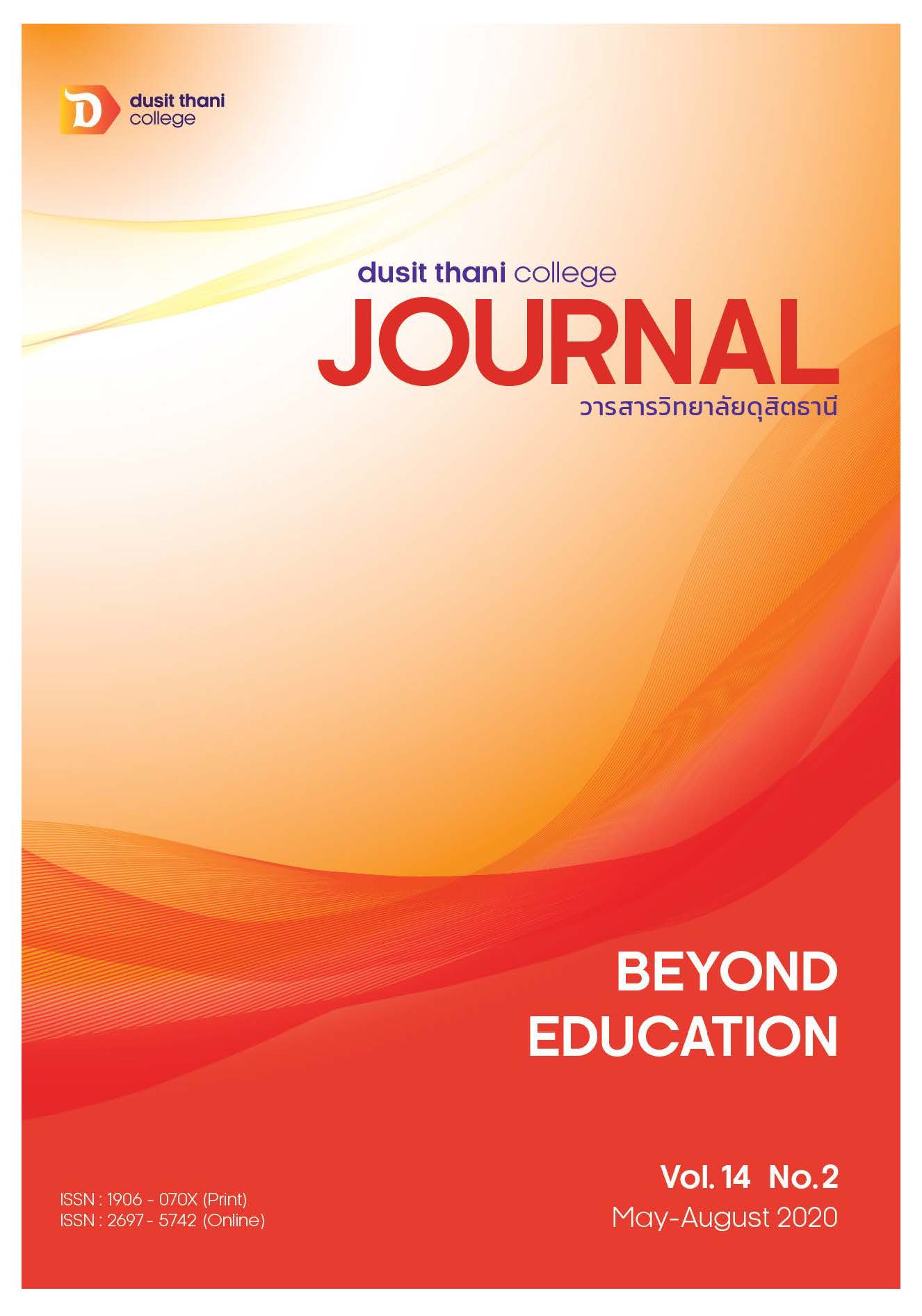รูปแบบการจัดการความรู้ของเมืองสมุนไพรจังหวัดปราจีนบุรีเพื่อการท่องเที่ยวเชิงสุขภาพ
Main Article Content
บทคัดย่อ
การวิจัยครั้งนี้มีวัตถุประสงค์เพื่อศึกษารูปแบบการจัดการความรู้ของเมืองสมุนไพรจังหวัดปราจีนบุรีเพื่อการท่องเที่ยวเชิงสุขภาพ การวิจัยครั้งนี้เป็นการวิจัยเชิงคุณภาพ ใช้วิธีวิทยาการวิจัยทางพฤติกรรมศาสตร์และสังคมศาสตร์ ประชากรที่ใช้ในการวิจัยเชิงคุณภาพเป็นกลุ่มผู้ให้ข้อมูลแบบเจาะจง เป็นผู้บริหารที่มีบทบาทเกี่ยวข้องกับการพัฒนาเมืองสมุนไพรจังหวัดปราจีนบุรีและมีบทบาทการเป็นผู้นำที่ได้รับการยอมรับระดับจังหวัดและชุมชนท้องถิ่น รวมทั้งสิ้น 52 คน โดยแบ่งออกเป็น 3 กลุ่ม ได้แก่ กลุ่มที่ 1 ผู้เชี่ยวชาญจากหน่วยงานภาครัฐที่มีตำแหน่งบริหาร จำนวน 20 คน กลุ่มที่ 2 ผู้ให้ข้อมูลจากธุรกิจการท่องเที่ยวที่มีตำแหน่งบริหาร จำนวน 11 คน และกลุ่มที่ 3 ผู้นำระดับชุมชน ปราชญ์ผู้รู้ และเครือข่ายกลุ่มผู้ปลูกสมุนไพรและเกษตรแบบอินทรีย์ จำนวน 9 คน สำหรับการสนทนากลุ่ม (Focus Group) เป็นผู้ที่เกี่ยวข้องจากภาครัฐ ภาคเอกชน และภาคประชาชน จำนวน 12 คน ในลักษณะที่เป็นทางการ ผลการวิจัย พบว่า รูปแบบการจัดการความรู้ของเมืองสมุนไพรจังหวัดปราจีนบุรี ประกอบด้วย 6 ขั้นตอน คือ 1) การบ่งชี้ความรู้ 2) การสร้างและการแสวงหาความรู้ 3) การเผยแพร่ความรู้ 4) การจัดเก็บความรู้ และ 5) การประยุกต์ใช้ความรู้
Article Details
นโยบายการพิจารณากลั่นกรองบทความ
- บทความวิจัยและบทความวิชาการทุกเรื่องที่จะได้รับการตีพิมพ์ต้องผ่านการพิจารณากลั่นกรองโดยผู้ทรงคุณวุฒิ (Peer Review) ในสาขาที่เกี่ยวข้อง จำนวน 3 ท่าน/บทความ
- บทความ ข้อความ ภาพประกอบและตารางประกอบที่ลงตีพิมพ์ในวารสารเป็นความคิดเห็นส่วนตัวของผู้เขียน กองบรรณาธิการไม่จำเป็นต้องเห็นด้วยเสมอไป และไม่มีส่วนรับผิดชอบใด ๆ ถือเป็นความรับผิดชอบของผู้เขียนแต่เพียงผู้เดียว
- บทความที่จะได้รับการตีพิมพ์จะต้องไม่เคยตีพิมพ์ เผยแพร่ที่ใดมาก่อน และไม่อยู่ระหว่างการพิจารณาของวารสารฉบับอื่น หากตรวจสอบพบว่ามีการตีพิมพ์ซ้ำซ้อน ถือเป็นความรับผิดชอบของผู้เขียนแต่เพียงผู้เดียว
- บทความใดที่ผู้อ่านเห็นว่าได้มีการลอกเลียนหรือแอบอ้างโดยปราศจากการอ้างอิง หรือทำให้เข้าใจผิดว่าเป็นผลงานของผู้เขียน กรุณาแจ้งให้กองบรรณาธิการวารสารทราบจะเป็นพระคุณยิ่ง
เอกสารอ้างอิง
Amer Productivity Center.
Antonio, P.M. & Ana-Rosa, D.O. (2016). Health Tourism: Conceptual Framework and Insights from the Case of a Spanish Mature Destination. Tourism & Management Studies, 12(1), 86-96.
Bushel, R. & Sheldon, P.J. (2009). Wellness and Tourism: Mind, Body, Spirit, Place.
New York: Cognizant Communication Corporation.
Chao Phya Abhaibhubejhr Hospital. (2016). Meeting Documents and Proposals for the Herbal
City Plan. Prachinburi: Chao Phya Abhaibhubejhr Hospital Foundation.
Chimplee, K. (2012). Knowledge Management Models for Local Wisdom in Wickerwork
Handicrafts: A Case Study of Local Community Enterprises in Nakhon Ratchasima Province. Degree Doctor of Philosophy. Bangkok: NIDA.
Corbin, J. & Strauss. (2008). Basics of Qualitative Research. London: Sage.
Davenport, T. & Prusak, L. (1998). Working Knowledge: How organizations manage what they know. Boston: Harvard Businness School. Press Narong Phopreuksanun, Kittichai
Jitangwattana, B. & Srikhampa, P. (2014). Sustainable Tourism Development. Bangkok:
Dharmasarn Printing Company Limited.
Jampa, K. (2010). Knowledge Management of Local Wisdom in Herbs of Herbal Clubs in
Kumcha-E District, Mukdahan Province. Khon Kaen: Khon Kaen University.
Jyothis, T. (2016). Health Tourism: Pros and Cons. International Journal of
Multidisciplinary Research and Modern Education. 2(1), 640-643.
Laekhaphan, T. & Saravanawong, J. (2015). Knowledge Management of Herb: a Case Study of Bandongbang Herbal Group at Tambon Dongkeerek, Mueang District, Prachinburi Province. Journal of Library and Information Science. 8(1), 12-25.
Lorsuwannarat, Tippawan. (2006). Learning Organization: From Concepts to Practices.
Bangkok: National Institute of Development Administration.
Marquardt, M. J. (2002). Building the Learning Organization: a System Approach to Quantum Improvement and Global Success. New York: McGrawHill.
Panich, Wijarn. (2008). Knowledge Management in Knowledge-based Society and
Economics. Bangkok: The Knowledge Management Institute Foundation.
Phasookyeud, Prapon. (2007). Knowledge Management (KM) Issue Driving of LO. Bangkok
Yaimai.
Phopreuksanun, N., Nuanthong, K. & Preuksakorn, L. (2016). Knowledge Management of Local Wisdom for Quality Development of Processed Herbs. RPBS Academic Conference and Creative Research. 16-17 December, 902-908.
Podhisita, Chai. (2013). Science and Art of Qualitative Research. Bangkok: Amarin Printing &
Publishing Public Company Limited.
Pornsittikul, P. & Nontasiri, P. (2014). An Assessment of Potential’s Tourist Attraction for Health Tourism Routes Development, Bangkrathum, Phitsanulok Province. Phitsanulok: Naresuan University.
Prachinburi Governor Office. (2016). Herbal City of Prachinburi Plan. Prachinburi:
Prachinburi Governor Office.
Sirimahasakorn, B. (2007). Knowledge Management for Excellence: Idea can do:
Management to be Leader. Bangkok: Sangdao.
Sirimahasakorn, B. & Kwangthong, P. (2009). Knowledge Management Methods to
Intelligent Organization. Bangkok: Sangdao.
Suanpang, Phannee. (2009). Information Technology and Innovation for Knowledge
Management. Bangkok: SE-Education Public Company Limited.
Saunders, M., Lewis, P., & Thornhill, A. (2009). Research Methods for Business Students.
London: Harlow Financial Times Prentice Hall.
Sutheewasinnon, Prapaipim and Pasunon, Prasopchai. (2016). Sampling Strategies for
Qualitative Research. Parichart Journal, Thaksin University, 29(2), 41-57.
Tourism Authority of Thailand. (2009). Health Tourism. Bangkok: Tourism Authority of Thailand.
Wararat, W., Sakda, P., & Pengtowong, P. (2015). Knowledge Management of Ban Suk-kasem Indigenous Cloth Weaving Group Banglen District Nakhon Pathom Province.
Nakhon Pathom: Rajamangala University of Technology Rattanakosin.


